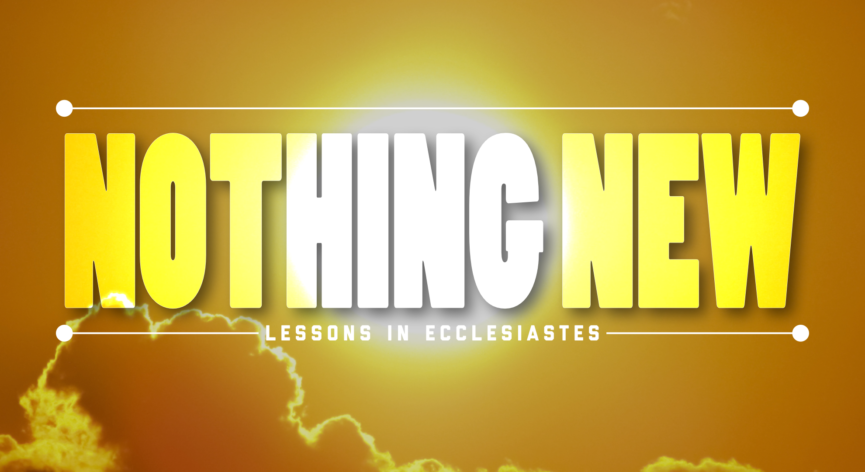Introduction
Ecclesiastes is one of the most unique books in the Bible. Truth be told, according to tradition Ecclesiastes almost did not make it into the Bible (some say it was the last book to be approved to be a part of the Old Testament). Nevertheless, Ecclesiastes was received into the Old Testament and placed in the section we call Wisdom literature.
Author
The first verse of Ecclesiastes says this: The words of the Teacher, son of David, king in Jerusalem (Ecclesiastes 1:1). We are supposed to think the author is King Solomon. Solomon was the third King who reigned over Israel. He inherited the throne from his father David, and he was one of Israel’s most beloved Kings. Whether or not Solomon actually wrote Ecclesiates we can not completely verify, but in the ancient world, writing in someone else’s name was a gesture of great honor.
The Message of Ecclesiastes
The writer of Ecclesiastes goes in search of life’s deepest meaning, life’s greatest good, the “one thing necessary” (Luke 10:42). After applying himself and all his aptitude and skill to this quest, the Teacher concludes –
“Meaningless! Meaningless!”
says the Teacher.
“Utterly meaningless!
Everything is meaningless.”
Ecclesiastes 1:2
Although the Teacher has many truthful and insightful things to say about life and meaning, we cannot accept this conclusion.
The Structure of Ecclesiastes
One of the criticisms of Ecclesiates is that the book rambles, lacks a cohesive narrative, and even seems to contradict itself. But the very structure of Ecclesiates is another way the Teacher makes his point (life rambles, lacks a cohesive narrative, and contradicts itself). In his book Three Philosophies of Life author Peter Kreeft identifies some themes that are very helpful in understanding the message of Ecclesiastes and connecting personally with the book.
- The Five Toils
The word “toil” is used 24 times in the book, that’s twice per chapter on average. In Ecclesiastes “toil” stands for something that the Teacher thinks may be something worth striving for, worth building a life around. These “toils” are candidates for the greatest good, the Teacher is hopeful they will yield ultimate meaning, but they all disappoint in the end. The “toils” in Ecclesiastes are Wisdom (Ecclesiastes 1:12-18), Pleasure (Ecclesiastes 2:1-11), Power (Ecclesiastes 4:13-16), Community (Ecclesiastes 6:3-6), Religion (Ecclesiastes 5:1-7)
- The Five Vanities
Another key word in the book is meaningless (vanity in older translations). In Hebrew the world means vapor or mist. The Teacher bolsters his claim that life is meaningless by pointing out that there are maddening forces at work in life, powers that turn life on its head. These “vanities” are Randomness (Ecclesiastes 9:11), Evil & Evil People (Ecclesiastes 3:16. 4:1), Death (Ecclesiastes 2:14-16), God (Ecclesiastes 12:13-14), and Time (Ecclesiastes 3:1-14).
The End of the Matter
Although there is much we must learn from the Teacher of Ecclesiastes, much that he sees correctly, we can not accept his conclusion that life is meaningless. The Teacher, using only the strength of unaided human reason and observation, cannot see or foresee (as the prophets did) what is new under the sun. Jesus. Jesus is the answer to the Teacher’s quest. Jesus gives life ultimate and enduring meaning. A personal relationship with Jesus changes everything (Matthew 9:9-13, Luke 19:1-10). Ecclesiastes has the power to clean our souls of the over promises that life makes to us. Ecclesiastes stops us in our tracks, recognizes that the things we find meaningful are so, but only in the short term. Ecclesiastes sets us right at the foot of the cross and asks us to look up and believe.

